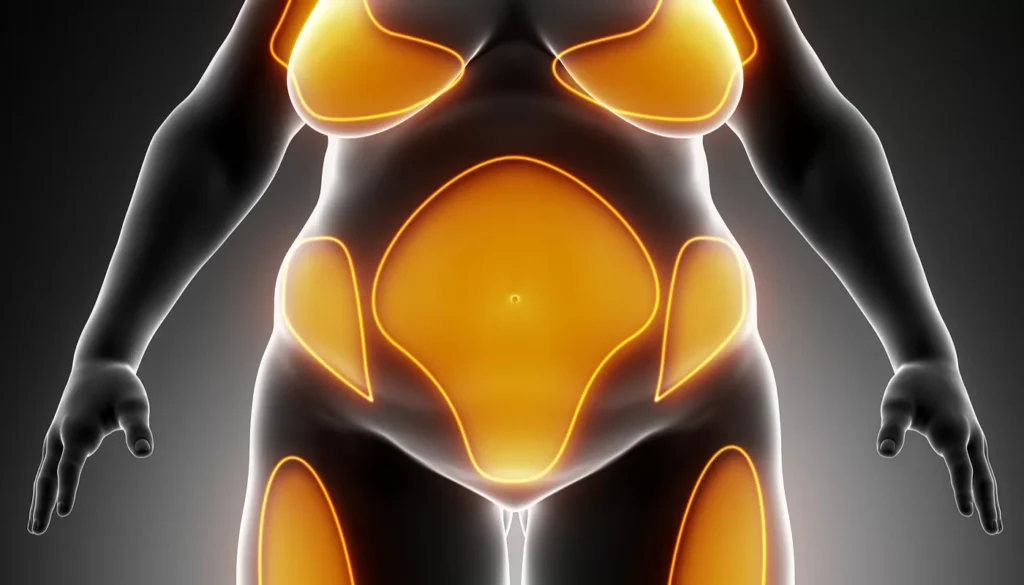Adverts
Having fatty liver, also known as hepatic steatosis, is a condition that deserves attention. Although it often presents no symptoms in the early stages, it can develop into more serious problems, such as inflammation and even chronic diseases.
Recognizing early signs and taking preventive measures is essential to protecting your health. 🛡️
Adverts
In this content, we will explore the main symptoms that may indicate fatty liver and how to identify the most common risk factors.
Also, discover habits that help prevent and even reverse this condition. Liver health is directly linked to overall well-being, so taking care of it should be a priority. 🍏
Adverts
Whether you want to better understand your body's signals or adopt a healthier lifestyle, the information gathered here will help you make conscious and informed decisions.
Keep reading and stay up to date on this important topic! 🚨

Fatty liver: what is it and why should you be concerned? 🤔
Ah, the famous “fatty liver”! It sounds like a dish, but there’s nothing gourmet about it. Fatty liver, or hepatic steatosis, is a health problem that’s growing faster than the line for a burger on a delivery app. 🛵
Recommended Articles:
Basically, what happens is the accumulation of fat in the liver cells, and this can happen for a number of reasons, such as poor diet, a sedentary lifestyle or even excessive alcohol consumption. If you think this is a condition that only affects people who live on fast food, spoiler alert: that's not quite the case. Even people who have a “normal” weight can suffer from it.
The big problem is that, in the initial phase, fatty liver doesn't usually give many signs. It's like that quiet classmate at school who suddenly becomes the center of trouble. But, if ignored, it can develop into more serious problems, such as inflammation or even cirrhosis. Then, the situation becomes much less fun. 😬
Fatty liver: what are the most common causes?
Okay, before you blame that Sunday barbecue or grandma's dessert, it's important to understand that fatty liver is a multifactorial problem. In other words, there are several reasons behind it. Let's take a look at the main ones:
- Unbalanced diet: Diets rich in bad fats, sugar and refined carbohydrates (that white bread you love) are enemies of the liver. 🍩
- Sedentary lifestyle: There's no point in running away: spending the whole day on the couch binge-watching series contributes to the accumulation of fat in the body – and in the liver.
- Alcohol consumption: Alcohol is metabolized by the liver and, in excess, can cause an overload, resulting in fat accumulation.
- Chronic diseases: Conditions such as type 2 diabetes, obesity and high cholesterol are strongly associated with the problem.
- Use of certain medications: Some medications, when used for long periods, can promote the accumulation of fat in the liver.
Now that you know the main villains, let's understand how this condition can manifest itself in the body. 👇
Symptoms of fatty liver: the warning your body may be giving you 🚨
If fatty liver were a series, the beginning would be quite monotonous, without any major twists and turns. This is because, in most cases, the symptoms are non-existent or so subtle that the person doesn't even notice them. But when the condition progresses, the story changes completely!
Signs that deserve attention
If you’re thinking, “But Diego, how am I supposed to know something is wrong if it doesn’t hurt?”, don’t worry, I’ll explain! Some symptoms may start to appear as the fatty liver progresses. Keep an eye out for:
- Constant fatigue: You know that tiredness that just won't go away, even after a good night's sleep? It could be a sign that your liver is overloaded.
- Abdominal discomfort: A feeling of heaviness or pain in the upper right abdomen is a common symptom.
- Loss of appetite: Does eating feel like a chore? Your body may be giving you a message.
- Abdominal bloating: A larger abdomen, for no apparent reason, can be another symptom.
- Liver changes: In blood tests, elevated levels of liver enzymes can indicate problems.
If any of these signs appear, it's time to put denial aside and see a doctor. After all, health is no joke, right? 🤷♂️
Fatty liver diagnosis: how do you know if you're on the team? 🩺
You may be wondering: “Ok, Diego, but how do I find out if I have fatty liver?” The answer is simple: doctors and tests! No guessing on the internet, okay?
The exams that come into play
Typically, the diagnosis begins with a good conversation with your doctor, where he or she will assess your health history and habits (so don't hide that extra pizza from the weekend, okay?). Then, he or she may order some tests, such as:
- Abdominal ultrasound: This is the most common test to detect fat in the liver. It is quick, painless and very efficient.
- Blood tests: They help check the levels of liver enzymes such as ALT and AST, which indicate the health of the liver.
- Magnetic resonance imaging: In more specific cases, it may be requested to assess the severity of the condition.
- Liver biopsy: This is more invasive and only used in extreme cases, to confirm inflammation or more serious damage to the liver.
With this information in hand, the doctor will be able to assess whether you have fatty liver and, most importantly, what stage the problem is at. Let's talk about the treatment? 👇
Treatment and prevention: how to take care of your liver with love 💚
If there is any good news in this story, it is that fatty liver is reversible! With a few lifestyle changes and medical monitoring, you can turn things around and restore your liver's health. Want to know how? Let's go!
Adopt habits your liver will love
Prevention and treatment go hand in hand in this case. Some attitudes can make all the difference:
- Balanced diet: Include more fruits, vegetables, whole grains, and lean proteins in your diet. Cut down on processed foods, fried foods, and sugars. 🥗
- Exercise practice: Get moving! Walking, running, going to the gym or even taking a dance class can help reduce fat in the liver.
- Weight control: Maintaining a healthy weight is essential to avoid putting strain on the liver.
- Moderation in alcohol: If alcohol is responsible for the problem, the recommendation is simple: cut down or stop altogether.
- Medical monitoring: Get regular check-ups and follow your doctor's instructions. He or she may prescribe medication or supplements if necessary.
Remember, change takes time. But the effort is worth every second when it comes to health. Now tell me: how is your relationship with your liver? Is it working out or is it overloaded? 😉
Conclusion
In summary, fatty liver, also known as hepatic steatosis, is a condition that requires attention and care. Although it is often silent in the early stages, it can develop into more serious problems, such as inflammation or even chronic liver disease. Therefore, being alert to the most common symptoms, such as fatigue, pain on the right side of the abdomen and changes in blood tests, is essential to act early and preserve your health. 🩺
Adopting a healthy lifestyle is the best strategy to prevent and treat this problem. This includes maintaining a balanced diet, rich in nutrients and low in saturated fats, exercising regularly 🏃♀️ and avoiding excessive alcohol consumption. In addition, seeing your doctor regularly is essential to monitor your liver health and ensure that it is functioning properly.
Remember: your health is your greatest asset. 💚 Being informed about conditions such as fatty liver and taking preventive measures can make all the difference in the long run. Don't wait for symptoms! Take care of your body today to ensure a better quality of life in the future. To learn more about the topic and adopt habits that benefit your health, continue exploring our content. 😉



